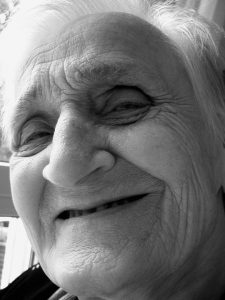6.6 Learning Activities
Open Resources for Nursing (Open RN)
Learning Activities
(Answers to “Learning Activities” can be found in the “Answer Key” at the end of the book. Answers to interactive activity elements will be provided within the element as immediate feedback.)
Practice applying concepts related to cognitive impairments to the following client scenarios:
Scenario A

Clara is a 77-year-old female who is admitted to an inpatient acute care center for scheduled hip-replacement surgery. See Figure 6.13 for an image of Clara.[1] On admission for the surgical procedure, Clara is functionally independent and living at home but reports having some “mild forgetfulness.” The surgery and post-anesthesia recovery period are uneventful, but on postoperative Day 2, she develops severe confusion and agitation.
Critical Thinking Questions
- What additional assessment data should the nurse collect?
- Compare/contrast the symptoms of dementia, delirium, and depression. What condition is the client exhibiting? What are the possible triggers?
- What are priority nursing interventions for the client at this time?
Scenario B

Betty is an 82-year-old female resident of a memory care center with a history of moderate Alzheimer’s disease. See Figure 6.14 for an image of Betty in a memory care center.[2] Staff report that she has episodes of anxiety and agitation that can lead to aggressive behaviors such as yelling, cursing, and waving her cane threateningly at staff members.
Critical Thinking Questions
- What are the typical symptoms of moderate Alzheimer’s disease?
- What assessments should the nurse perform if Betty exhibits anxiety, agitation, or aggressive behavior?
- In addition to identifying and eliminating any potential triggers, how should the nurse respond to Betty therapeutically if an episode occurs?
- What types of medications may be prescribed for Betty to slow the progression of Alzheimer’s disease?
Test your knowledge using this NCLEX Next Generation-style question. You may reset and resubmit your answers to this question an unlimited number of times.[3]
- “woman-76527_960_720.jpg” by geralt is licensed under CC0 ↵
- “35528913166_1a61470157_h.jpg” by Senior Guidance is licensed under CC BY 2.0 ↵
- “Chapter 6 Assignment 1” by Tami Davis for OpenRN is licensed under CC BY-NC 4.0 ↵

